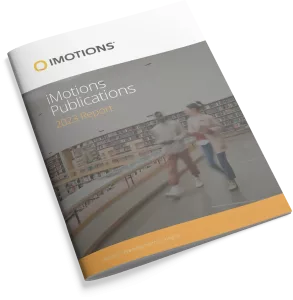-
Cognitive load associated with speaking clearly in reverberant rooms
Communication is a fundamental aspect of human interaction, yet many individuals must speak in less-than-ideal acoustic environments daily. Adapting their speech to ensure intelligibility in these varied settings can impose a significant cognitive burden. Understanding this burden on talkers has significant implications for the design of public spaces and workplace environments, as well as speaker […] -
Cannabis Users’ and Non-Users’ Differential Responses to Two Anti-Cannabis Campaigns
Even though multiple states have approved legal recreational use of cannabis, the expansion of recreational cannabis legalization has led to public health concerns in the United States. Young adults (18–25 years old) have the highest percentage of cannabis use disorder compared to all other age groups. The purpose of this study is to compare cognitive […] -
AI-enhanced analysis of naturalistic social interactions characterizes interaffective impairments in schizophrenia
Social deficits in schizophrenia have been attributed to an impaired attunement to mutual interaction, or “interaffectivity”. While impairments in emotion recognition and facial expressivity in schizophrenia have been consistently reported, findings on mimicry and social synchrony are inconsistent, and previous studies have often lacked ecological validity. To investigate interaffective behavior in dyadic interactions in a […] -
How immersive technologies impact behavioral responses in destination marketing: the role of physiological arousal, presence, and age
Purpose This paper aims to investigate the effectiveness of immersive virtual reality (VR) media and the influence of user’s age in the context of destination marketing by exploring their impact on cognition (presence), affection (arousal), and behavioral (intention to visit and intention to recommend the destination) outcomes. Design/methodology/approach A laboratory experiment was conducted to compare […] -
Towards Automated Competency Estimation for Math Education– An Eye Tracking and Emotion Analysis Study
Personalization relies on user models– representations of the user’s competencies, preferences, and skills to adapt the system behavior to optimize interaction. But the anticipated gain in productivity is offset by the effort involved in collecting and maintaining said user model. This is particularly pronounced in systems like ALeA (Adaptive Learning Assistant, https://courses.voll-ki.fau.de/), where the learner […] -
Pupil contagion variation with gaze, arousal, and autistic traits
Pupillary contagion occurs when one’s pupil size unconsciously adapts to the pupil size of an observed individual and is presumed to reflect the transfer of arousal. Importantly, when estimating pupil contagion, low level stimuli properties need to be controlled for, to ensure that observations of pupillary changes are due to internal change in arousal rather […] -
This article is… Consumer reactions to unfinished teasers for digital content
To preview digital content and arouse consumers’ interest, online providers often use short teasers designed in an unfinished form, such that the teaser begins a new sentence but does not finish it. These teasers aim to create curiosity and trigger consumption of the advertised content. However, we reveal that consumers’ reactions to unfinished teasers are […] -
Implicit and explicit liking of a snack with health- versus taste-related information
Despite extensive consumer testing during product development, healthy snacks often fail in the market. This indicates that other factors are at play besides what is traditionally being tested before product launch. The aim of the study was to examine how exposure to a snack with a health versus taste message affects perceived healthiness, expected tastiness, […] -
Visual attention to sustainability messages and self-reported willingness to pay for sustainable takeout and delivery packaging in Honduras
Recent changes in the consumption habits of the population suggest consumers have increased the number of purchases of take-out and livery food. This trend comes with unintended negative externalities to the environment, as it has resulted in increased plastic pollution due to single-use plastic food containers. Unfortunately, sustainable and eco-friendly alternatives tend to be more […] -
Expert gaze as a usability indicator of medical AI decision support systems: a preliminary study
Given the current state of medical artificial intelligence (AI) and perceptions towards it, collaborative systems are becoming the preferred choice for clinical workflows. This work aims to address expert interaction with medical AI support systems to gain insight towards how these systems can be better designed with the user in mind. As eye tracking metrics […]
Research Report 2024
In-depth look at the scientific landscape as powered by iMotions software, showcasing groundbreaking research and the impact of our tools in various scientific and industrial fields.

iMotions Science Resources
Looking for white papers, validation reports or research show casing iMotions Multimodal capabilities?
Share Your Research

850+ universities worldwide with an iMotions human behavior lab
73 of the top 100 highest ranked universities
710+ published research papers using iMotions
iMotions is used for some of the most interesting human behavior research studies carried out by top researchers around the world. Contact us to have your publication featured here.
The authors of these publications have used iMotions as a software tool within their research.
“Software should be cited on the same basis as any other research product such as a paper or a book; that is, authors should cite the appropriate set of software products just as they cite the appropriate set of papers” (Katz et al., 2020).
We therefore encourage you to cite the use of iMotions where appropriate.
How to cite iMotions
APA
iMotions (10), iMotions A/S, Copenhagen, Denmark, (2024).
Note: adjust the version and year where relevant.
5 Most Popular Blogs
Learn How to Conduct Human Behavior Research with iMotions
Publications
Read publications made possible with iMotions
Blog
Get inspired and learn more from our expert content writers
Newsletter
A monthly close up of latest product and research news

